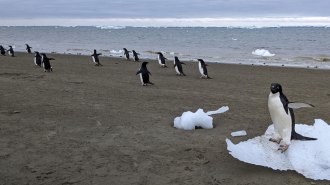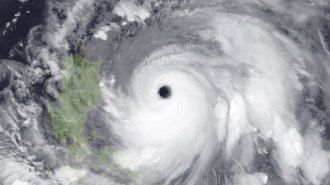Uncategorized
-

The long and short of science
Editor in Chief Nancy Shute discusses the centennial of quantum mechanics’ framework, Hubble’s 35th anniversary and the legacy of Kanzi the bonobo.
By Nancy Shute -

-

Math puzzle: The conundrum of sharing
Solve the math puzzle from our June 2025 issue, in which friends must find ways to all enjoy hot mud beds.
By Ben Orlin -
 Health & Medicine
Health & MedicineWet fingers always wrinkle in the same way
Pruney fingertips aren't swollen sponges — the wrinkles actually come from blood vessels constricting and pulling skin inward.
-
 Paleontology
PaleontologySloths once came in a dizzying array of sizes. Here’s why
A new fossil and DNA analysis traces how dozens of sloth species responded to climate shifts and humans. Just two small tree-dwelling sloths remain today.
-
 Health & Medicine
Health & MedicineIt’s tricky to transplant a bladder. How surgeons finally did it
The person who received the bladder is doing well, and the successful transplant could offer hope to thousands of people with bladder dysfunction.
By Payal Dhar -
 Climate
ClimatePenguin poop gives Antarctic cloud formation a boost
Penguin poop provides ammonia for cloud formation in coastal Antarctica, potentially helping to mitigate the impacts of climate change in the region.
-
 Science & Society
Science & SocietyTrump’s ‘Golden Dome’ plan has a major obstacle: Physics
Scientists suggest the missile defense plan will face big hurdles, especially given its projected timeline and cost.
-
 Health & Medicine
Health & MedicineDon’t wait until menopause to strengthen your bones
Screening for osteoporosis is recommended at age 65, but experts say women should be proactive about bone health long before that.
-
 Earth
EarthGamma rays flared as this lightning bolt formed
Thunderstorms are known to generate gamma rays, the highest energy radiation on Earth. But pinning the burst to a specific bolt is new.
By Sid Perkins -
 Artificial Intelligence
Artificial IntelligenceA new AI-based weather tool surpasses current forecasts
The AI tool used machine learning to outperform current weather simulations, offering faster, cheaper, more accurate forecasts.
-
 Physics
PhysicsScientists used a levitating magnet to hunt for dark matter
The quantum-based magnet technique could allow scientists to spot ultralight dark matter particles.